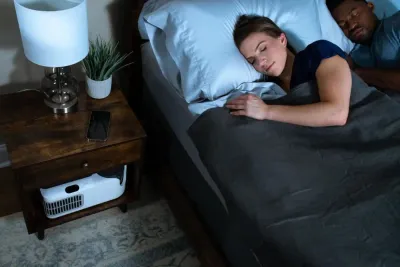
Key Takeaways
Sleeping too much can be a sign of poor sleep quality or underlying health issues, rather than a simple need for extra rest.
- Most adults function best with 7 to 9 hours of sleep, and regularly sleeping more than 9 hours may signal disrupted or non restorative sleep.
- Oversleeping is often linked to conditions such as sleep apnea, depression, chronic fatigue, or circadian rhythm disruption rather than lack of motivation.
- Consistently excessive sleep has been associated with higher risks of weight gain, headaches, diabetes, and cardiovascular issues.
- Sleep tracking tools can help reveal whether long sleep durations are actually restorative or masking frequent nighttime disruptions.
- Improving sleep hygiene with consistent bedtimes, a cool sleep environment, and optimized sleep tech can help you reach healthier sleep duration without oversleeping.
We don’t usually think much about sleep—until it starts working against us. The right amount can recharge your body, sharpen your focus, and reset your mood. But too much? That’s where things get a little tricky.
Oversleeping isn’t just about hitting snooze a few extra times on Sunday morning. It can signal deeper health issues or lifestyle imbalances. Instead of waking refreshed, you might feel groggy, sluggish, and oddly drained.
Sleep should fuel you, not flatten you. While solid rest is essential for good health, oversleeping can tip the scales the wrong way. Knowing why it happens can help you catch underlying problems early and fine-tune your habits for a healthier rhythm.
Let’s break down the common causes of oversleeping.
Irregular Sleep Schedules
Your body runs on an internal clock, your circadian rhythm, that tells you when to sleep, wake, and even when to digest food. Throw it off with random bedtimes and late sleep-ins, and suddenly your system doesn’t know what’s up or down.
This “social jetlag” is what happens when you stay up late and sleep in on weekends, then struggle to snap back to early wake-ups during the week. The result? Fatigue, grogginess, and oversleeping in an attempt to make up for lost rest.
Oversleeping won’t solve the problem. It might mask the sleep debt for a bit, but your off-kilter schedule is still quietly sabotaging your sleep quality.
The solution is simple but powerful. Stick to a consistent sleep schedule and wake times, weekends included. A steady rhythm means deeper sleep at night, sharper energy during the day, and a body clock that works with you instead of against you.
Sleep Better and Wake Refreshed
Improve your sleep quality and wake up feeling refreshed. Say goodbye to oversleeping and grogginess—The Chilipad Dock Pro helps maintain your ideal body temperature, providing a more comfortable and restful night’s sleep.
Sleep Disorders
Sleep disorders don’t just mess with your nights—they spill over into your days, leaving you drained and unfocused. Conditions like hypersomnia and sleep apnea are prime culprits, and both can seriously derail your rest.
Oversleeping can sometimes be more than just a bad habit; it may point to an underlying sleep disorder. From circadian rhythm issues and narcolepsy to insomnia and obstructive sleep apnea, knowing the signs matters.
Spotting them early opens the door to proper diagnosis and treatment, so you can finally get the kind of rest that restores instead of depletes.
Hypersomnia
Hypersomnia means logging long hours of sleep at night but still dragging through the day. Sometimes it’s linked to conditions like depression, other times it shows up on its own without a clear cause.
Managing it often takes a mix of approaches—medications, lifestyle tweaks, and treating any underlying health issues that might be fueling the fatigue.
Sleep Apnea
Sleep apnea is a condition where breathing repeatedly stops and starts during sleep because the throat muscles block the airway.
The result is restless, fragmented sleep that leaves you dragging through the day, battling morning headaches, and snapping with irritability. Treatment can range from lifestyle changes to CPAP machines or even surgery in some cases.
Left unchecked, sleep apnea can snowball into bigger health issues. If you’re dealing with constant daytime sleepiness or fatigue, it's best to get checked by a healthcare provider. Proper treatment can restore better sleep and improve overall health.
Medication Side Effects
Some medications may cause excessive sleepiness due to their sedative effects. Here’s a look at some common types of medications that might cause oversleeping as a side effect:
Antidepressants
Some antidepressants, such as tricyclics and certain SSRIs, can cause excessive sleepiness due to their sedative properties, which are helpful for insomnia treatment.
Blood Pressure Medications
Certain blood pressure medications, especially beta-blockers, and alpha-blockers, can cause fatigue and increased sleepiness. These effects can result from the lowering of blood pressure and slowed heart rates, making patients feel more tired and inclined to sleep longer.
Antihistamines
Diphenhydramine, found in Benadryl and other sleep aids, is an older antihistamine commonly used to treat allergies. While it can be helpful in treating short-term insomnia, its sedative effect may cause oversleeping or drowsiness the next day.
Antipsychotics
Psychiatric medications like quetiapine or olanzapine can cause drowsiness and increase long sleep duration in patients.
Anticonvulsants
Topiramate and gabapentin are commonly used to manage seizures and bipolar disorder. However, they can cause drowsiness as a side effect, leading to longer sleep duration or difficulty waking up.
Alcohol and Substance Use
That nightcap might knock you out fast, but alcohol is a sleep saboteur. It cuts into REM—the stage that leaves you feeling restored. As a result, your sleep becomes shallow and choppy. As it wears off, you’re more likely to wake up during the night, which explains why mornings feel rough and why you might oversleep trying to make up for it.
It’s not just alcohol. Some medications, recreational drugs, and other substances can mess with your sleep cycle too—making you sleep hot, stay asleep too long, or wake up often. This results in low-quality sleep and lingering grogginess.
Did You Know: Certain drugs and medications, as well as recreational substances, can affect how we sleep and can cause our body temperature to increase, making you sleep hot

Lifestyle and Work Demands
Oversleeping isn’t always about your body, it’s often about your schedule. Shift work, late nights, or unpredictable hours can throw your natural sleep-wake cycle off balance, making real sleep harder to come by.
Caregivers, night-shift workers, and anyone pulling long or irregular hours know this struggle all too well. When sleep gets squeezed, your body tries to repay the debt by pushing you to oversleep whenever it gets the chance.
Sometimes it’s also about priorities. If sleep keeps getting bumped down your to-do list, that shortage adds up fast.
Physical and Mental Health Conditions
Oversleeping often has more to do with health than habit. Conditions like chronic pain, diabetes, fibromyalgia, or hypothyroidism can leave you drained, making it tough to stay awake and alert.
Sleeping more than nine hours in a day can be a sign that something deeper is going on—whether it’s a sleep disorder or another health issue. Mental health plays a role too. Depression and anxiety can throw off sleep patterns, causing you to sleep too much, while too little sleep brings its own set of problems.
Striking the right balance is key. If you’re constantly oversleeping or running on empty, it’s worth talking to a healthcare professional. It could be your body’s way of flagging something that needs attention.
Sleep Disorders
Oversleeping can result from sleep disorders that cause extreme sleepiness.
Circadian Rhythm Sleep-wake Disorders
A group of medical conditions caused by a mismatch between a person's natural sleep-wake cycle and the light-darkness cycle. This misalignment can result in difficulties falling asleep, staying asleep, or waking up at the desired time.
Narcolepsy
A person with narcolepsy experiences excessive daytime sleepiness, causing them to fall asleep at inappropriate times.
Obstructive sleep apnea (OSA)
A person with obstructive sleep apnea experiences interruptions in their breathing while they're asleep, causing issues such as snoring and breathing pauses.
Restless leg syndrome (RLS)
Restless Leg Syndrome is a disorder that causes uncomfortable sensations in the legs, such as tingling, creeping, and burning, that urge individuals to move their legs.
Discover more about common sleep disorders and their impact on your health.
Illnesses
It is common to sleep longer than usual when feeling sick. This is especially true for people with respiratory infections such as the flu or a cold. However, it's important to note that this extended sleep may not necessarily be restful.
Research has found that although people with respiratory infections sleep longer, their sleep quality may be poor. [2]
Lack of Sleep
Oversleeping is often your body’s way of paying off sleep debt. Miss out on enough rest, and eventually, your system demands a catch-up session—sometimes stretching well past your usual wake-up time.
After a packed week or a string of late nights, it’s normal to crash and log extra hours in bed. That longer sleep isn’t laziness; it’s your body trying to recover from the backlog of missed rest.
Understanding Sleep Debt
Sleep debt is the gap between the rest your body needs and the hours you actually get. Think of it like a credit card balance—skip sleep, and the deficit piles up.
Burning the midnight oil for work or late-night plans racks up that debt fast. Your body will eventually demand payback, which is why you crash hard on weekends or crave naps after too many short nights.
Playing catch-up throws off your circadian rhythm and can leave you feeling even more drained. The smarter move is steady, consistent rest—about 7 to 9 hours a night—so you stay balanced without racking up a sleep tab.
Tip: To avoid this, maintaining consistent sleep hygiene—aiming for 7-9 hours of sleep nightly—is key to preventing it and keeping your health on track.

How to Overcome Oversleeping
There are various ways to overcome oversleeping, including setting a consistent sleep schedule, optimizing your sleep environment, limiting naps, avoiding stimulants before bed, engaging in regular exercise, and practicing stress-relief techniques.
However, if these strategies don't seem to help, consulting a healthcare professional to rule out any underlying conditions might be necessary.
Check out our blog for detailed tips and advice on how to stop oversleeping.
Final Thought
Sleep is vital, but too much of it can signal deeper issues with your health or lifestyle. Oversleeping often leaves you groggy instead of refreshed, and it’s usually a sign that something in your routine—or your body—is out of balance.
We’ve covered the usual suspects: irregular schedules, sleep disorders like hypersomnia or sleep apnea, side effects from medications, and even environmental factors. Any of these can throw off your sleep patterns and push you into logging more hours than your body really needs.
The fix starts with consistency—stick to a set sleep schedule, be mindful of how substances and meds affect you, and create an environment that sets you up for solid rest. If oversleeping doesn’t let up, it’s worth checking in with a healthcare provider to dig into possible underlying causes.
Dialing in your habits and addressing root issues can help you trade groggy mornings for energy-filled days.
Frequently Asked Questions About Sleeping Too Much
Can Sleeping Too Much Be Unhealthy?
Yes—consistently sleeping more than 9–10 hours a night may signal underlying health issues, such as depression, sleep disorders, or chronic fatigue.
How Many Hours of Sleep Is Too Much?
Generally, more than 9 hours regularly may be excessive for most adults, especially if you still wake up groggy or unrested.
Why Do I Feel Tired Even After Sleeping for 10 Hours?
Oversleeping can throw off your circadian rhythm and reduce sleep quality, leading to that dreaded “sleep hangover” feeling despite logging major pillow time.
What Are the Signs That You Might Be Sleeping Too Much?
Look out for these clues:
- You regularly sleep over 9–10 hours
- You feel sluggish or groggy upon waking
- You still need naps during the day
- You struggle with focus or mood despite long sleep
- Your sleep patterns feel inconsistent or erratic









